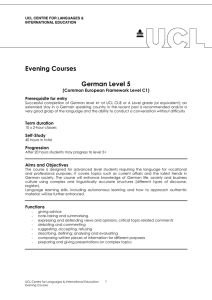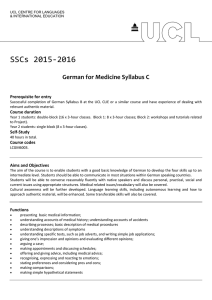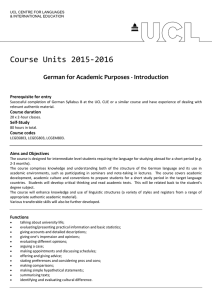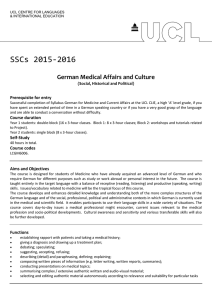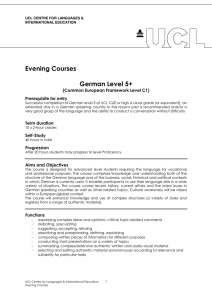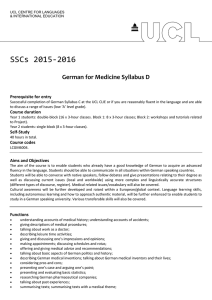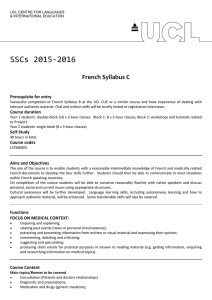SSCs 2015-2016 German for Medicine and Current Affairs Prerequisite for entry
advertisement
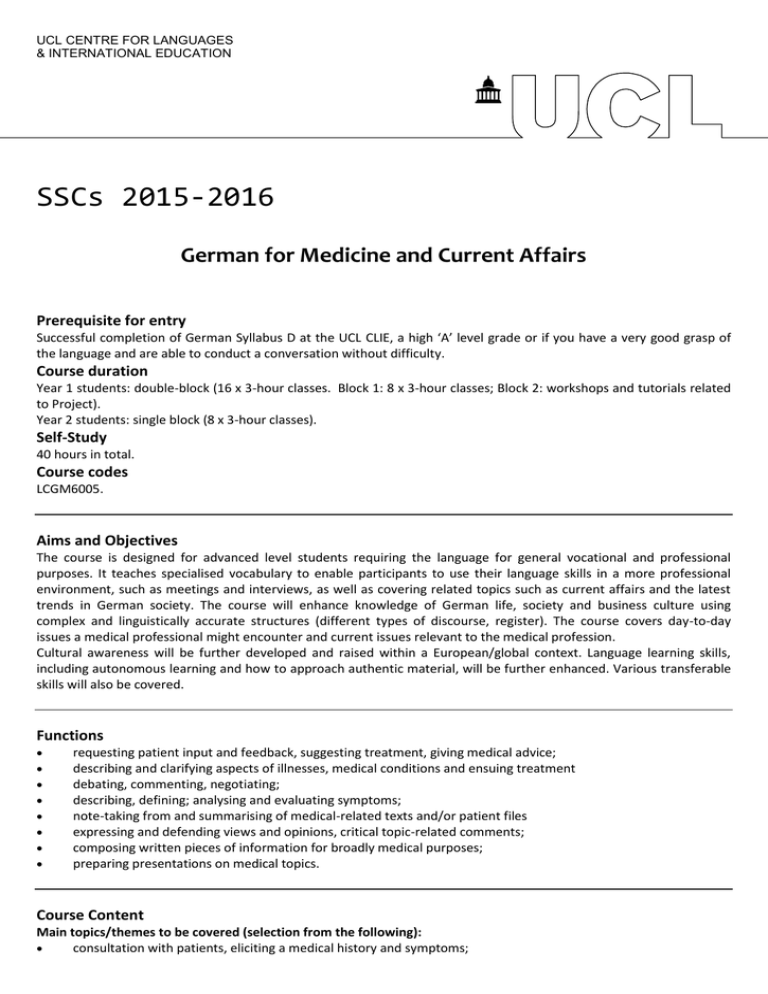
UCL CENTRE FOR LANGUAGES & INTERNATIONAL EDUCATION SSCs 2015-2016 German for Medicine and Current Affairs Prerequisite for entry Successful completion of German Syllabus D at the UCL CLIE, a high ‘A’ level grade or if you have a very good grasp of the language and are able to conduct a conversation without difficulty. Course duration Year 1 students: double-block (16 x 3-hour classes. Block 1: 8 x 3-hour classes; Block 2: workshops and tutorials related to Project). Year 2 students: single block (8 x 3-hour classes). Self-Study 40 hours in total. Course codes LCGM6005. Aims and Objectives The course is designed for advanced level students requiring the language for general vocational and professional purposes. It teaches specialised vocabulary to enable participants to use their language skills in a more professional environment, such as meetings and interviews, as well as covering related topics such as current affairs and the latest trends in German society. The course will enhance knowledge of German life, society and business culture using complex and linguistically accurate structures (different types of discourse, register). The course covers day-to-day issues a medical professional might encounter and current issues relevant to the medical profession. Cultural awareness will be further developed and raised within a European/global context. Language learning skills, including autonomous learning and how to approach authentic material, will be further enhanced. Various transferable skills will also be covered. Functions requesting patient input and feedback, suggesting treatment, giving medical advice; describing and clarifying aspects of illnesses, medical conditions and ensuing treatment debating, commenting, negotiating; describing, defining; analysing and evaluating symptoms; note-taking from and summarising of medical-related texts and/or patient files expressing and defending views and opinions, critical topic-related comments; composing written pieces of information for broadly medical purposes; preparing presentations on medical topics. Course Content Main topics/themes to be covered (selection from the following): consultation with patients, eliciting a medical history and symptoms; describing, suggesting and explaining possible forms of treatment; an outline of the German health insurance system; introduction to medical studies and the medical profession in German speaking countries; different organic systems and related illnesses; gathering information about developments in research and treatment; prominent German speaking figures in the medical field, past and present Skills Reading reading for gist (skimming), scanning for specific information; giving opinions, presenting arguments; analysis of current medical and health topics in major newspapers/magazines and online Writing summaries; analysis and review of articles; preparing presentation outlines Listening radio, TV, audio and video recordings; patient-doctor interviews; presentations, note-taking Speaking formal and informal discussions, debates; role play; presentations Linguistic Structures Discourse Strategies spontaneous conversation with native speakers in specific situations (doctor-patient-discourse, conferring with colleagues; analysing/comparing texts from various sources (different text types); improving listening and reading skills by dealing with a variety of complex authentic materials Main aspects of these strategies improving confidence in using German as a foreign languages in medicine-related situations; consolidating and improving listening and reading skills by dealing with a variety of complex authentic materials; consolidating and improving oral and written linguistic range as well as accuracy; improving the ability to use subject-specific vocabulary Grammar (selection from the following) revision of tenses (forms and usage); revision and expansion of cases (forms and usage); prepositions; verbs with a fixed preposition; prepositions with case change; relative clauses; complex sentences; passive and alternative structures; subjunctive II; introduction to subjunctive I two-part conjunctions; grammar of texts Learning Resources Bilingual dictionary (e.g. Collins). Not pocket size. Materials for the course will be drawn from: Authentic written material from various sources, including specialist publications and the media; Authentic audio and audio-visual material; Variety of internet sources In addition there is a wide range of language learning materials available for self-study in the Self-Access Centre. There will also be regularly updated information on cultural events connected with Germany, German language and culture, which can be accessed through the CLIE website.
